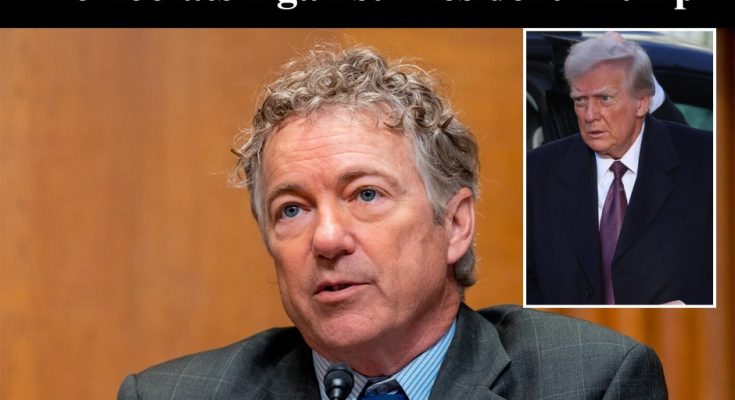Kentucky Republican Senator Rand Paul has once again expressed his opposition to President Donald Trump, this time regarding the president’s extensive application of tariffs on foreign imports aimed at compelling nations to enter into trade agreements that are more equitable for the United States.
In a statement on X, the senator contended that the Constitution empowers Congress to levy new taxes. He asserted that since Trump’s tariffs effectively act as taxes, they necessitate the consent of both the House and Senate.
However, the Trump administration and a significant number of Republicans view tariffs as instruments of foreign policy, which falls under the jurisdiction of the Executive Branch.
He stated, ‘The Constitution explicitly indicates that Congress, not the president, holds the power of the purse. All new taxes, which tariffs are classified as, must originate in the House of Representatives before being sent to the Senate for ratification.’
The Constitution explicitly designates Congress, rather than the president, as having the authority over financial matters. Any new taxes, including tariffs, are required to be initiated in the House of Representatives prior to receiving approval from the Senate.
The Constitution grants Congress the power to levy taxes and oversee international trade via tariffs. Nevertheless, throughout the years, Congress has enacted laws that allow presidents to exercise certain tariff powers, particularly during emergencies.
On April 2, Trump announced that foreign trade and economic practices have resulted in a national emergency, and his directive implements tariffs aimed at bolstering the United States’ international economic standing and safeguarding American workers, as stated by the White House in a release accompanying the executive order.
His comments were made just prior to a Senate vote that sought to repeal Trump’s Liberation Day tariffs, which are presently suspended; however, GOP leaders successfully thwarted an attempt to restrict the president’s authority during a vote on Tuesday.
Furthermore, as reported by Politico, the White House cautioned congressional offices that Trump would veto the bill if it were to reach his desk. Paul aligned with GOP Senators Susan Collins of Maine and Lisa Murkowski of Alaska, voting alongside all Democrats in support of the resolution, which ultimately failed with a 49-49 vote.+
The attempts by Democrats to advance the legislation were obstructed by the absence of Senator Sheldon Whitehouse (D-R.I), who was returning to the United States from South Korea, as reported by Axios. Additionally, retiring anti-Trump Senator Mitch McConnell from Kentucky did not participate in the vote.
His office issued a statement affirming his consistent opposition to tariffs, arguing that a trade war is detrimental to American families and businesses. Furthermore, McConnell’s office stated that he views tariffs as a tax increase affecting all individuals.
Legislators possess the authority to independently initiate votes aimed at rejecting the administration’s proclamation of a national emergency. On Wednesday, Senator Ron Wyden (D-Ore.) utilized this tactic to request a vote.
This Democratic strategy underscores the rifts within the Republican Party concerning apprehensions about escalating prices and the degree to which President Trump is seeking to augment presidential authority, as further noted by Axios. Senate Majority Leader John Thune (R-S.D.) remarked to the outlet, ‘I believe these are primarily symbolic votes that Democrats are attempting to orchestrate.
Republicans are endeavoring to provide the administration, as previously stated, with some latitude to determine if they can secure favorable agreements while awaiting the outcomes of those efforts.’ Paul indicated to Axios that this matter may reemerge in the near future.
The discussion remains significant, as a month from now, if substantial tariffs are imposed leading to a significant decline in the stock market, coupled with a poor first quarter of growth and a further downturn in the second quarter, individuals may begin to question whether the policy is beneficial or detrimental.



